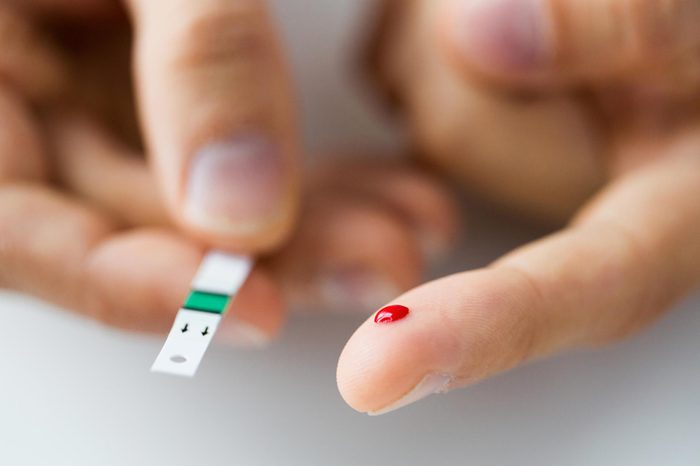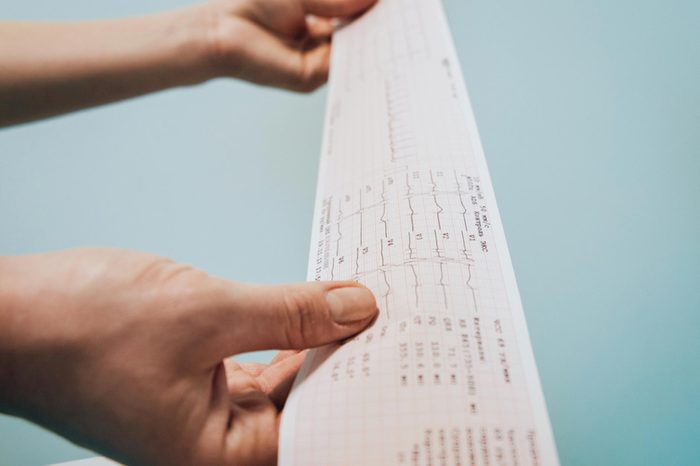
What is anemia?
Anemia is defined as the condition of not having enough healthy red blood cells to carry oxygen throughout the body, and there are many forms of it. Some people, like those suffering from conditions like sickle cell anemia or thalassemia, are anemic from birth; their bodies inherit difficulty producing red blood cells or specific parts of red blood cells. Other times anemia is caused by a B12 vitamin deficiency. But the majority of the roughly 3 million Americans suffer from iron-deficiency anemia, says Marc J. Kahn, MD, the Peterman-Prosser professor and senior associate dean at Tulane University School of Medicine in New Orleans. Iron is necessary for the production of healthy red blood cells, and the people at greatest risk for losing iron are women of childbearing age, thanks to their monthly periods. So read on to discover the surprising symptoms of anemia, and what to do if you have any of them.

It’s hard to catch your breath when you exercise
Without enough iron, the body cannot produce enough of a specific type of protein called hemoglobin, which is crucial to the functioning of red blood cells. Hemoglobin, which is so rich with iron that it gives blood its red color, allows oxygen to bond to the cells so the cells can carry it in the bloodstream throughout the body. When there isn’t enough iron to create adequate amounts of hemoglobin, some parts of the body will not receive the oxygen they need. The result: You can’t exercise the way you used to, says Dr. Kahn. “So you might say, ‘I used to be able to run three miles and now when I run two blocks, it’s hard to catch my breath.'” (Don’t miss what doctors want you to know about normal oxygen levels.)
You’re just soooooo tired
University of Chicago Associate Professor of Medicine Andrew Artz, MD, says one of the most common (and prominent) anemia symptoms is a general feeling of exhaustion. “Fatigue is the predominant symptom,” Dr. Artz says. “The challenge of the symptom of fatigue is that every person has a different experience of how they notice it. Some will simply feel more tired; others will feel it with activity.” The tiredness is caused by the same process that leads to shortness of breath and dizziness: Without enough iron or vitamin B12, there’s not enough hemoglobin, and without enough hemoglobin, there’s not enough oxygen to fuel the body. So if you’re exhausted, you may have anemia or any of these other possible medical causes of fatigue.

Your skin is looking more pale
Underneath your skin are capillaries that carry blood cells. If you have fewer blood cells, you don’t have enough blood coursing through your skin and look pale. This is a fairly common sign, says Dr. Kahn. “When I look underneath someone’s eyelids, I can detect how pale they are and that’s a pretty good indication for anemia. Or sometimes the palms or fingernail beds look pale,” he says. Luckily (or not) there are a host of ailments that show themselves in your face, making them hard to miss.

You feel pain in your chest
When there are fewer healthy red blood cells circulating, the heart has to work even harder to move them through the body. As a result, the heart beats faster than normal and you may start to feel the strain as chest pain. This is not a problem to dismiss, especially if you have other heart problems.

You’re pregnant or losing a lot of blood
Maybe you’re consuming what would normally be an adequate amount of iron, but you’re still anemic. One reason: You’re pregnant. “Pregnant women are at risk for iron deficiency because in order to deliver oxygen to the fetus, the body compensates by decreasing the thickness of the blood by increasing the watery part of it,” says Dr. Kahn. Another reason is that your baby-to-be cannibalizes your iron stores. (One reason there’s iron in your prenatal vitamins.) But men and women past their childbearing years can still develop anemia, and that’s usually due to some type of underlying bleeding from, say, colon cancer, says Dr. Kahn.

You eat a vegan diet
Because iron is in soy beans, dark green leafy vegetables, and tofu in addition to lean red meat, vegans and vegetarians can still consume the amount of iron their body needs. However, dietitian Allegra Burton, RDN, says it’s impossible to get vitamin B12–which is also crucial for making red blood cells–from plant sources. As a result, the only way for those with vegan diets to consume an adequate amount of vitamin B12 is to regularly take a supplement, something she recommends all vegans do. These are the iron-rich foods every vegetarian should eat.

You’re craving ice cubes and other strange snacks
One of the weirder symptoms of anemia is pica, or the tendency to crave non-nutritional items like ice cubes, baking soda, clay, or even pencils or dried paint. Doctors and researchers still don’t know why patients crave chewing or eating such unusual food substances, but it’s a common symptom of iron-deficiency anemia, says Dr. Artz.

Your hands and feet are cold
“People who have iron-deficient anemia report cold hands and feet, says Dr. Katz. “This is the way the body compensates for too few red blood cells—it restricts blood flow to areas that are absolutely essential, like the heart, brain, and kidneys. Because there’s less blood flow to the skin patients feel cold.” If you’re suffering from cold extremeties, you may want to check out the best sources of iron you can get straight from the kitchen, no pills involved.

You’re getting an abnormal number of headaches
Most of us get headaches every once in a while, from stress, lack of sleep, illness, and a slew of other reasons. But if you find yourself getting more headaches than what’s normal for you, it may be time to check your iron levels. “To compensate for decreased red cells, there’s increased total blood flow to the brain and that can cause some pain,” Dr. Katz explains. The headaches can range from low-grade to migraine, too, so don’t brush it off even if you’re only feeling mild pain.

You have an irregular heartbeat
One of the more serious signs of iron-deficiency anemia is that your heart starts beating irregularly. Anemic people have low levels of hemoglobin, which is the protein in red blood cells that helps transport oxygen to the rest of your body. This means that without enough hemoglobin, the heart has to work that much harder to carry oxygen. This is what leads to the feeling that your heart is beating irregularly or quickly.

So what do you do if you’re anemic?
If you’re experiencing some of these symptoms of anemia—especially if you look pale and start to notice that you can’t work out as hard as you once could—go to a doctor and ask for a complete blood count, advises Dr. Katz. That way, the doctor can do a complete evaluation to pinpoint exactly which type of anemia you have, its source, and what you should do to treat it. Dr. Artz warns against purchasing any over-the-counter anemia combatant, because there is not a catch-all cure for all forms of anemia. The key is understanding the cause, so you can work with your doctor and a dietitian to eat iron-rich foods. If you suspect you’re not eating enough of these foods, you should also be on the lookout for these 13 signs of an iron deficiency.